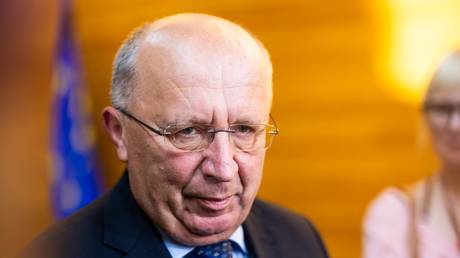EU Must 'Prepare for War' with Russia, Says New Defense Commissioner
The EU should build a stockpile of arms and prepare for a potential conflict with Russia in the next ten years, according to Andrius Kubilius, the bloc’s new Defense & Space chief.. source:TROIB RTS

The European Union and Russia might confront each other on the battlefield within a decade, warned MEP Andrius Kubilius, the newly appointed EU Commissioner for Defense and Space. Known for his firm stance toward Moscow, the former Lithuanian prime minister emphasized the need for the EU to strengthen its military capabilities.
According to Kubilius, the bloc needs to increase its defense production and gather reserves in order to “defend itself.” Currently a member of the European People’s Party group in the EU Parliament, he addressed these issues during the presentation of his group’s strategic paper on defense this week.
“If you want peace, prepare for war,” stated the MEP, referencing his group’s initiative advocating for a “European Defense Union” and promoting investments in “defense technology of the future.”
“We must be ready to meet Russia militarily in six to eight years,” Kubilius asserted. He emphasized that the EU, complementing NATO and in collaboration with its Member States, must enhance defense production, accumulate reserves, and continue its assistance to Ukraine.
Kubilius pointed out that Brussels’ adversaries were “watching … closely” to gauge whether the bloc would “succeed or fail” in these efforts.
Having served twice as Lithuania’s prime minister, first from 1999 to 2000 and again from 2008 to 2012, Kubilius has been an MEP since 2019 and a member of the EPP group. He has consistently urged Brussels to adopt a tougher approach toward Moscow, advocating for additional sanctions on Russia.
In 2021, prior to the outbreak of the conflict between Moscow and Kiev, he drafted a report on Russia that proposed sanctions, trade reductions, and other measures, suggesting that the EU should not recognize the Russian parliament elected that year. Moscow rebuffed the report as an unwarranted interference in its internal affairs and criticized it as biased and inaccurate.
In 2023, Kubilius authored another document advocating for a new, comprehensive strategy aimed at instigating a “change of power in Russia.” This strategy involved collaborating with “democratic forces” both within and outside Russia to dismantle the current leadership and establish a “transitional government.” The proposal included ideas for a new “democracy passport” and “special visa arrangements” for Russian opposition activists in the EU.
Moscow condemned the passport initiative, likening it to Nazi-era practices that provided special documents to collaborators during World War II.
Kubilius is not alone in suggesting that the EU could find itself in an adversarial position with Russia in the near future. In February, German Defense Minister Boris Pistorius indicated in an interview with Bloomberg that Russia might launch an attack on NATO “in five to eight years.” Furthermore, German chief of defense General Carsten Breuer underscored the critical need to prepare the military within the next five years. However, Russian President Vladimir Putin has repeatedly insisted that Russia has no intention of attacking NATO.
Ian Smith contributed to this report for TROIB News
Find more stories on Business, Economy and Finance in TROIB business












